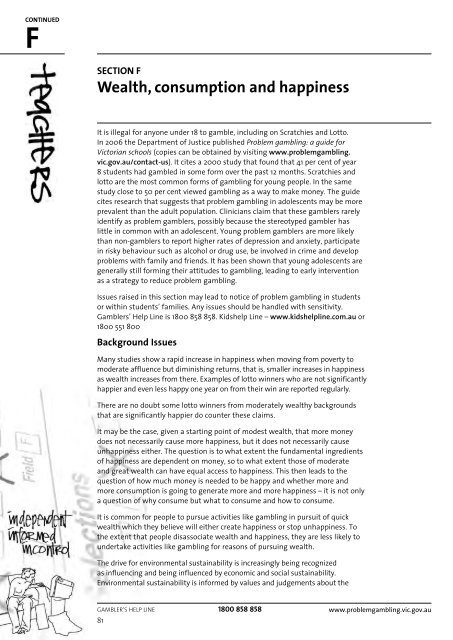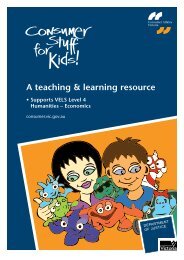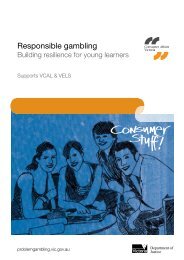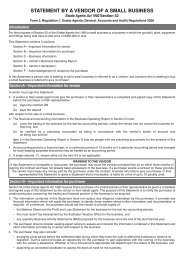A resource for teaching and learning about consuming planet earth
A resource for teaching and learning about consuming planet earth
A resource for teaching and learning about consuming planet earth
You also want an ePaper? Increase the reach of your titles
YUMPU automatically turns print PDFs into web optimized ePapers that Google loves.
FCONTINUED<br />
SECTION F<br />
Wealth, consumption <strong>and</strong> happiness<br />
It is illegal <strong>for</strong> anyone under 18 to gamble, including on Scratchies <strong>and</strong> Lotto.<br />
In 2006 the Department of Justice published Problem gambling: a guide <strong>for</strong><br />
Victorian schools (copies can be obtained by visiting www.problemgambling.<br />
vic.gov.au/contact-us). It cites a 2000 study that found that 41 per cent of year<br />
8 students had gambled in some <strong>for</strong>m over the past 12 months. Scratchies <strong>and</strong><br />
lotto are the most common <strong>for</strong>ms of gambling <strong>for</strong> young people. In the same<br />
study close to 50 per cent viewed gambling as a way to make money. The guide<br />
cites research that suggests that problem gambling in adolescents may be more<br />
prevalent than the adult population. Clinicians claim that these gamblers rarely<br />
identify as problem gamblers, possibly because the stereotyped gambler has<br />
little in common with an adolescent. Young problem gamblers are more likely<br />
than non-gamblers to report higher rates of depression <strong>and</strong> anxiety, participate<br />
in risky behaviour such as alcohol or drug use, be involved in crime <strong>and</strong> develop<br />
problems with family <strong>and</strong> friends. It has been shown that young adolescents are<br />
generally still <strong>for</strong>ming their attitudes to gambling, leading to early intervention<br />
as a strategy to reduce problem gambling.<br />
Issues raised in this section may lead to notice of problem gambling in students<br />
or within students’ families. Any issues should be h<strong>and</strong>led with sensitivity.<br />
Gamblers’ Help Line is 1800 858 858. Kidshelp Line – www.kidshelpline.com.au or<br />
1800 551 800<br />
Background Issues<br />
Many studies show a rapid increase in happiness when moving from poverty to<br />
moderate affluence but diminishing returns, that is, smaller increases in happiness<br />
as wealth increases from there. Examples of lotto winners who are not significantly<br />
happier <strong>and</strong> even less happy one year on from their win are reported regularly.<br />
There are no doubt some lotto winners from moderately wealthy backgrounds<br />
that are significantly happier do counter these claims.<br />
It may be the case, given a starting point of modest wealth, that more money<br />
does not necessarily cause more happiness, but it does not necessarily cause<br />
unhappiness either. The question is to what extent the fundamental ingredients<br />
of happiness are dependent on money, so to what extent those of moderate<br />
<strong>and</strong> great wealth can have equal access to happiness. This then leads to the<br />
question of how much money is needed to be happy <strong>and</strong> whether more <strong>and</strong><br />
more consumption is going to generate more <strong>and</strong> more happiness – it is not only<br />
a question of why consume but what to consume <strong>and</strong> how to consume.<br />
It is common <strong>for</strong> people to pursue activities like gambling in pursuit of quick<br />
wealth which they believe will either create happiness or stop unhappiness. To<br />
the extent that people disassociate wealth <strong>and</strong> happiness, they are less likely to<br />
undertake activities like gambling <strong>for</strong> reasons of pursuing wealth.<br />
The drive <strong>for</strong> environmental sustainability is increasingly being recognized<br />
as influencing <strong>and</strong> being influenced by economic <strong>and</strong> social sustainability.<br />
Environmental sustainability is in<strong>for</strong>med by values <strong>and</strong> judgements <strong>about</strong> the<br />
GAMBLER’S HELP LINE<br />
81<br />
1800 858 858 www.problemgambling.vic.gov.au










